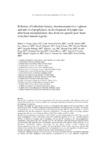Mostrar o rexistro simple do ítem
Influence of induction therapy, immunosuppressive regimen and anti-viral prophylaxis on development of lymphomas after heart transplantation: data from the spanish post–heart transplant tumour registry
| dc.contributor.author | Crespo-Leiro, María Generosa | |
| dc.contributor.author | Alonso-Pulpón, Luis | |
| dc.contributor.author | Arizón-del-Prado, José M. | |
| dc.contributor.author | Almenar, Luis | |
| dc.contributor.author | Delgado-Jiménez, Juan F. | |
| dc.contributor.author | Palomo, Jesús | |
| dc.contributor.author | Manito, Nicolás | |
| dc.contributor.author | Rábago, Gregorio | |
| dc.contributor.author | Lage, Ernesto | |
| dc.contributor.author | Díaz, Beatriz | |
| dc.contributor.author | Roig, Eulàlia | |
| dc.contributor.author | Pascual, Domingo | |
| dc.contributor.author | Blasco, Teresa | |
| dc.contributor.author | Fuente, Luis de la | |
| dc.contributor.author | Campreciós, Marta | |
| dc.contributor.author | Vázquez de Prada, José A. | |
| dc.contributor.author | Muñiz, Javier | |
| dc.date.accessioned | 2017-02-02T10:29:07Z | |
| dc.date.available | 2017-02-02T10:29:07Z | |
| dc.date.issued | 2007-11-20 | |
| dc.identifier.citation | Crespo-Leiro MG, Alonso-Pulpón L, Arizón JM, et al. Influence of induction therapy, immunosuppressive regimen and anti-viral prophylaxis on development of lymphomas after heart transplantation: data from the spanish post–heart transplant tumour registry. J Heart Transplant. 2007;26(11):1105-1109 | es_ES |
| dc.identifier.issn | 0887-2570 | |
| dc.identifier.uri | http://hdl.handle.net/2183/18040 | |
| dc.description.abstract | [Abstract] Background. Lymphoma after heart transplantation (HT) has been associated with induction therapy and herpesvirus infection. It is not known whether anti-viral agents administered immediately after HT can reduce the incidence of lymphoma. Methods. This study was a retrospective review of 3,393 patients who underwent HT in Spain between 1984 and December 2003. Variables examined included development of lymphoma and, as possible risk factors, recipient gender and age, induction therapies (anti-thymocyte globulin, OKT3 and anti–interleukin-2 receptor antibodies) and anti-viral prophylaxis (acyclovir or ganciclovir). To study the effect of evolving treatment strategy, three HT eras were considered: 1984 to 1995; 1996 to 2000; and 2001 to 2003. Results. Induction therapy was employed in >60% of HTs, and anti-viral prophylaxis in >50%. There were 62 cases of lymphoma (3.1 per 1,000 person-years, 95% confidence interval: 2.4 to 4.0). Univariate analyses showed no influence of gender, age at transplant, HT era, pre-HT smoking or the immunosuppressive maintenance drugs used in the first 3 months post-HT. The induction agent anti-thymocyte globulin (ATG) was associated with increased risk of lymphoma, and prophylaxis with acyclovir with decreased risk of lymphoma. Multivariate analyses (controlling for age group, gender, pre-HT smoking and immunosuppression in the first 3 months with mycophenolate mofetil and/or tacrolimus) showed that induction increased the risk of lymphoma if anti-viral prophylaxis was not used (regardless of induction agent and anti-viral agent), but did not increase the risk if anti-viral prophylaxis was used. Conclusions. Induction therapies with ATG or OKT3 do or do not increase the risk of lymphoma depending on whether anti-viral prophylaxis with acyclovir or ganciclovir is or is not employed, respectively. | es_ES |
| dc.language.iso | eng | es_ES |
| dc.publisher | Elsevier | es_ES |
| dc.relation.uri | http://dx.doi.org/10.1016/j.healun.2007.08.010 | es_ES |
| dc.rights | Atribución-NoComercial-SinDerivadas 3.0 España | es_ES |
| dc.rights.uri | http://creativecommons.org/licenses/by-nc-nd/3.0/es/ | * |
| dc.title | Influence of induction therapy, immunosuppressive regimen and anti-viral prophylaxis on development of lymphomas after heart transplantation: data from the spanish post–heart transplant tumour registry | es_ES |
| dc.type | info:eu-repo/semantics/article | es_ES |
| dc.rights.access | info:eu-repo/semantics/openAccess | es_ES |
| UDC.journalTitle | The Journal of Heart and Lung Transplantation | es_ES |
| UDC.volume | 26 | es_ES |
| UDC.issue | 11 | es_ES |
| UDC.startPage | 1105 | es_ES |
| UDC.endPage | 1109 | es_ES |
Ficheiros no ítem
Este ítem aparece na(s) seguinte(s) colección(s)
-
GI- GRINCAR - Artigos [216]






